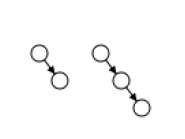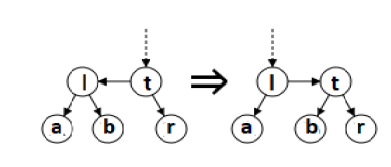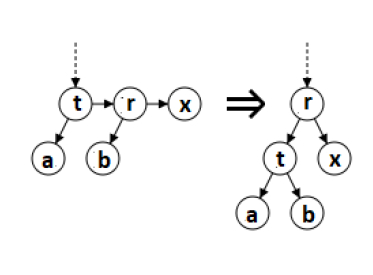What is an AA tree in C/C++?
In computer science, an AA tree is defined as a balanced tree implementation for efficient storage and retrieval of ordered data. AA trees are considered a variant of red-black trees, a binary search tree that supports efficient addition and deletion of entries. Unlike the red-black tree, the red node on the AA tree can only be added as a right child node and cannot be added as a left child node. The result of this operation is to simulate a 2-3 tree instead of a 2-3-4 tree, thus simplifying maintenance operations. The maintenance algorithm for red-black trees needs to assume or consider seven different shapes to correctly balance the tree.

Contrary to the red-black tree, the AA tree only needs to assume or consider two shapes, since only the right link can be red.

balanced rotation
Red-black trees require one balancing metadata bit (color) per node , while each node of the AA tree requires O(log(log(N))) metadata bits, in the form of integer "level". The following invariant applies to AA trees:
The level of each leaf node is considered to be 1.
The level of each left child node is 1 less than its parent node.
The level of each right child node is equal to or 1 less than its parent node.
The level of each right grandchild node is strictly smaller than that of its grandparent node.
Every node with level greater than 1 has two child nodes.
Rebalancing an AA tree is much simpler than rebalancing a red-black tree.
In an AA tree, only two different operations are needed to restore balance: "skew" and "split". Skew is treated as a right rotation, replacing a subtree consisting of a left horizontal link with a right horizontal link. In the case of Split, it is left-turning and level-increasing, replacing a subtree containing two less consecutive right horizontal links with two or more consecutive right horizontal links. The two operations "skew" and "split" are explained below.
The definition of function skew is as follows:
input: An AA tree that needs to be rebalanced is represented by a node, t. output: The rebalanced AA tree is represented by another node. if nil(t) then return nil else if nil(left(t)) then return t else if level(left(t)) == level(t) then Exchange the pointers of horizontal left links. l = left(t) left(t) := right(l) right(l) := t return l else return t end if end function

is:

input: An AA tree that needs to be rebalanced is represented by a node, t.
output: The rebalanced AA tree is represented by another node.
if nil(t) then
return nil
else if nil(right(t)) or nil(right(right(t))) then
return t
else if level(t) == level(right(right(t))) then
We have two horizontal right links. The middle node is taken, elevate it, and return it.
r = right(t)
right(t) := left(r)
left(r) := t
level(r) := level(r) + 1
return r
else
return t
end if
end functionCopy after login
input: An AA tree that needs to be rebalanced is represented by a node, t.
output: The rebalanced AA tree is represented by another node.
if nil(t) then
return nil
else if nil(right(t)) or nil(right(right(t))) then
return t
else if level(t) == level(right(right(t))) then
We have two horizontal right links. The middle node is taken, elevate it, and return it.
r = right(t)
right(t) := left(r)
left(r) := t
level(r) := level(r) + 1
return r
else
return t
end if
end function
The above is the detailed content of What is an AA tree in C/C++?. For more information, please follow other related articles on the PHP Chinese website!

Hot AI Tools

Undresser.AI Undress
AI-powered app for creating realistic nude photos

AI Clothes Remover
Online AI tool for removing clothes from photos.

Undress AI Tool
Undress images for free

Clothoff.io
AI clothes remover

AI Hentai Generator
Generate AI Hentai for free.

Hot Article

Hot Tools

Notepad++7.3.1
Easy-to-use and free code editor

SublimeText3 Chinese version
Chinese version, very easy to use

Zend Studio 13.0.1
Powerful PHP integrated development environment

Dreamweaver CS6
Visual web development tools

SublimeText3 Mac version
God-level code editing software (SublimeText3)

Hot Topics
 1377
1377
 52
52
 C language data structure: data representation and operation of trees and graphs
Apr 04, 2025 am 11:18 AM
C language data structure: data representation and operation of trees and graphs
Apr 04, 2025 am 11:18 AM
C language data structure: The data representation of the tree and graph is a hierarchical data structure consisting of nodes. Each node contains a data element and a pointer to its child nodes. The binary tree is a special type of tree. Each node has at most two child nodes. The data represents structTreeNode{intdata;structTreeNode*left;structTreeNode*right;}; Operation creates a tree traversal tree (predecision, in-order, and later order) search tree insertion node deletes node graph is a collection of data structures, where elements are vertices, and they can be connected together through edges with right or unrighted data representing neighbors.
 The truth behind the C language file operation problem
Apr 04, 2025 am 11:24 AM
The truth behind the C language file operation problem
Apr 04, 2025 am 11:24 AM
The truth about file operation problems: file opening failed: insufficient permissions, wrong paths, and file occupied. Data writing failed: the buffer is full, the file is not writable, and the disk space is insufficient. Other FAQs: slow file traversal, incorrect text file encoding, and binary file reading errors.
 How do I use rvalue references effectively in C ?
Mar 18, 2025 pm 03:29 PM
How do I use rvalue references effectively in C ?
Mar 18, 2025 pm 03:29 PM
Article discusses effective use of rvalue references in C for move semantics, perfect forwarding, and resource management, highlighting best practices and performance improvements.(159 characters)
 How do I use ranges in C 20 for more expressive data manipulation?
Mar 17, 2025 pm 12:58 PM
How do I use ranges in C 20 for more expressive data manipulation?
Mar 17, 2025 pm 12:58 PM
C 20 ranges enhance data manipulation with expressiveness, composability, and efficiency. They simplify complex transformations and integrate into existing codebases for better performance and maintainability.
 How does dynamic dispatch work in C and how does it affect performance?
Mar 17, 2025 pm 01:08 PM
How does dynamic dispatch work in C and how does it affect performance?
Mar 17, 2025 pm 01:08 PM
The article discusses dynamic dispatch in C , its performance costs, and optimization strategies. It highlights scenarios where dynamic dispatch impacts performance and compares it with static dispatch, emphasizing trade-offs between performance and
 How do I use move semantics in C to improve performance?
Mar 18, 2025 pm 03:27 PM
How do I use move semantics in C to improve performance?
Mar 18, 2025 pm 03:27 PM
The article discusses using move semantics in C to enhance performance by avoiding unnecessary copying. It covers implementing move constructors and assignment operators, using std::move, and identifies key scenarios and pitfalls for effective appl
 What are the basic requirements for c language functions
Apr 03, 2025 pm 10:06 PM
What are the basic requirements for c language functions
Apr 03, 2025 pm 10:06 PM
C language functions are the basis for code modularization and program building. They consist of declarations (function headers) and definitions (function bodies). C language uses values to pass parameters by default, but external variables can also be modified using address pass. Functions can have or have no return value, and the return value type must be consistent with the declaration. Function naming should be clear and easy to understand, using camel or underscore nomenclature. Follow the single responsibility principle and keep the function simplicity to improve maintainability and readability.
 What is auto type deduction? What are its benefits and limitations?
Mar 26, 2025 pm 11:23 PM
What is auto type deduction? What are its benefits and limitations?
Mar 26, 2025 pm 11:23 PM
The article discusses auto type deduction in programming, detailing its benefits like reduced code verbosity and improved maintainability, and its limitations such as potential confusion and debugging challenges.




